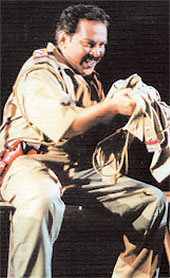 |
| A scene from 17 July |
Reborn as one of the more adventurous Bengali troupes under playwright-director Bratya Basu, Ganakrishti takes on the burning issue that most Bengali theatre refused to confront: Gujarat. In 17 July, set in a village of Panch Mahals district, Basu presents rape charges brought against a group of Muslim youths by two Hindu girls on a bus. He transcends this specific incident to reveal the canker of communal distrust in Indian society, among even ordinary non-fundamentalist people.
After showing the much-maligned police as upholders of law and order (contrary to their usual depiction in Indian theatre), Basu settles into the established genre of courtroom drama. A famed lawyer defends the accused against a bigoted prosecutor in a trial evidently founded on false allegations, before an audience openly hostile to the defendant and a judge ignorant of the statutes as well as apprehensive of those in power. We cannot expect justice in this near-kangaroo court.
Basu has matured as a dramatist, expressing the complexities of real life and characters. His younger self-indulgence surfaces once in Act 1 when he allows the opposing lawyers to get into a long debate, with the judge incredibly a mute spectator. The only other blemish is tarnishing the girls? evidence on the basis of their involvement in prostitution ? an unnecessary add-on.
Basu has matured even more as a director. He choreographs the rightwing lumpen frighteningly, making them disrupt proceedings from their seats in the auditorium and stage a victory dance. He gives every actor individualistic traits to cultivate; I do not wish to name anyone separately in this excellent team effort. All thinking Indians should see 17 July for its timely and provocative content.
Natyaranga addresses the communal problem too through Sachin Sengupta?s historical drama Siraj-ud-daula, which called for Hindu-Muslim amity and patriotism in 1938. Surajit Bandyopadhyay does a fine job of editing the classic for our times, sensitive to Sengupta?s main concerns: unite both communities and reject British historians? biased views. He also acts Siraj as a misunderstood hero, a nationalist and secular nawab betrayed by self-seeking courtiers and vilified by the scheming British for their own ends. Swapan Sengupta meticulously directs this costume drama, starring Santu Mukhopadhyay as Mir Jafar.











